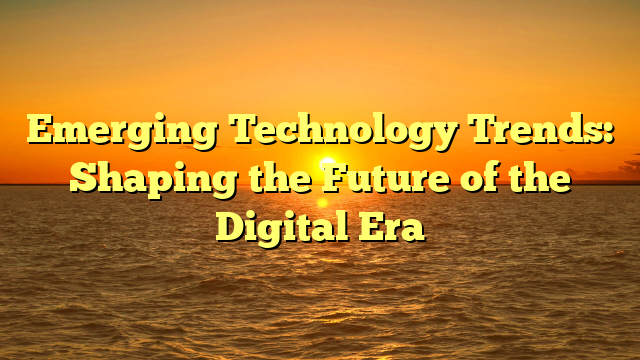Technology is evolving at an unprecedented pace, transforming industries, reshaping societies, and redefining the way we live and work. The latest technological trends reflect a push toward greater connectivity, intelligence, and sustainability. These Tempur99 innovations are not only driving efficiency but also creating new challenges that require careful consideration.
One of the most prominent trends today is Artificial Intelligence (AI). From healthcare to finance, AI is increasingly integrated into business operations and daily life. Beyond automation, AI offers predictive analytics, advanced decision-making, and personalized experiences. Generative AI, which powers tools capable of creating text, images, and even code, is expanding rapidly and sparking debates about ethics, intellectual property, and the future of human creativity.
Closely tied to AI is the growth of the Internet of Things (IoT). Smart devices and sensors are connecting homes, vehicles, factories, and even entire cities. This connectivity enables real-time monitoring, improved efficiency, and smarter decision-making across industries. For instance, smart homes can optimize energy usage, while connected factories streamline production. However, with greater connectivity comes heightened concerns over cybersecurity and data privacy.
Another transformative development is the widespread adoption of 5G networks. By offering significantly faster data transfer speeds and lower latency, 5G is unlocking possibilities that were previously impractical. Applications such as augmented reality (AR), virtual reality (VR), autonomous vehicles, and advanced robotics rely heavily on the performance enhancements brought by 5G. In the context of smart cities, 5G provides the backbone for seamless communication between infrastructure and connected devices.
Meanwhile, blockchain and Web3 technologies are gaining attention for their potential to decentralize the internet. Blockchain’s transparency and security make it attractive for financial services, supply chain management, and even digital identity solutions. Cryptocurrencies remain controversial, but the underlying technology offers a foundation for decentralized applications that could reshape how data and transactions are handled globally. Despite regulatory challenges, blockchain is expected to play an increasingly important role in digital transformation.
Sustainability has also become a major focus in the technology sector. Green technology innovations aim to reduce environmental impact by promoting energy efficiency and renewable solutions. From electric vehicles to eco-friendly data centers, businesses and governments are investing in technologies that balance progress with responsibility toward the planet. This trend reflects a growing demand for environmentally conscious practices among consumers and investors alike.
Looking further ahead, quantum computing is emerging as a field with immense potential. Although still in its experimental stages, quantum computing promises to solve problems far beyond the reach of traditional computers. Applications could range from drug discovery and advanced materials to complex financial modeling and national security. While commercial use may still be years away, the race for quantum supremacy among global tech giants is accelerating.
Taken together, these technological trends illustrate a world moving toward a more connected, intelligent, and sustainable future. Yet, they also raise critical questions about ethics, governance, and inclusivity. Data protection, digital inequality, and the risk of over-reliance on machines remain pressing issues. To ensure that technology benefits everyone, governments, businesses, and individuals must work together to create frameworks that balance innovation with responsibility.
In conclusion, the latest technology trends are more than just advancements in tools—they are shaping the foundation of a new digital era. As AI, IoT, 5G, blockchain, green tech, and quantum computing continue to develop, they will redefine how we experience the world. The challenge lies in harnessing these innovations wisely, ensuring that the digital future is both prosperous and equitable.
